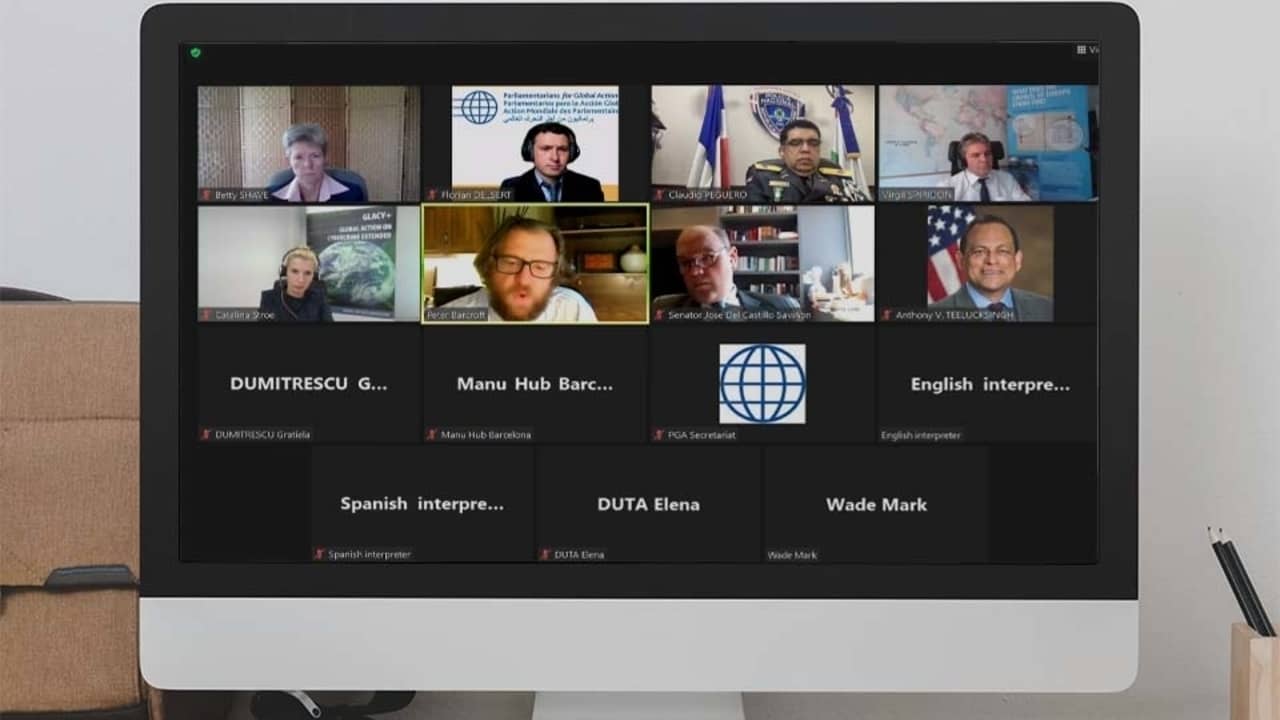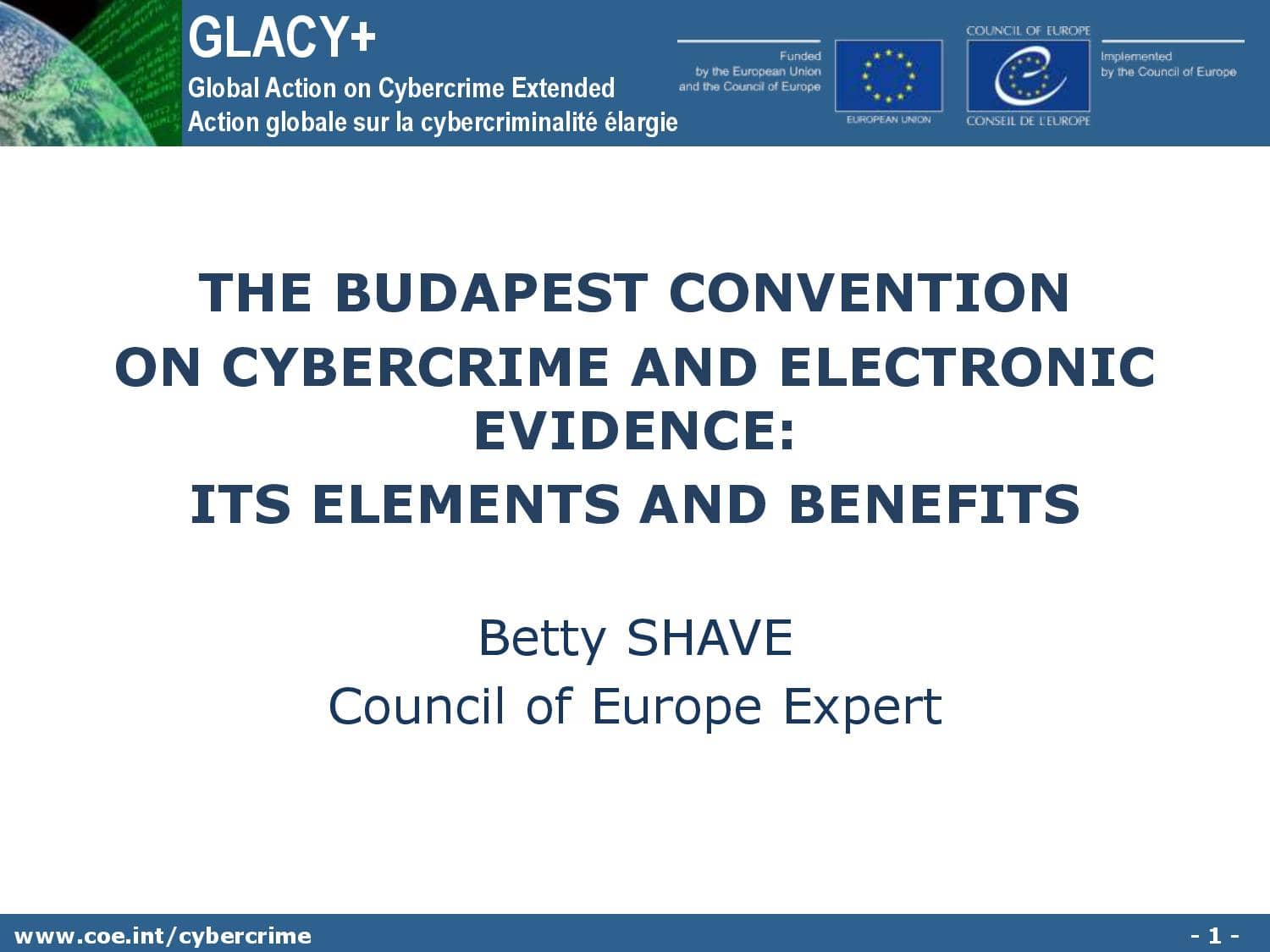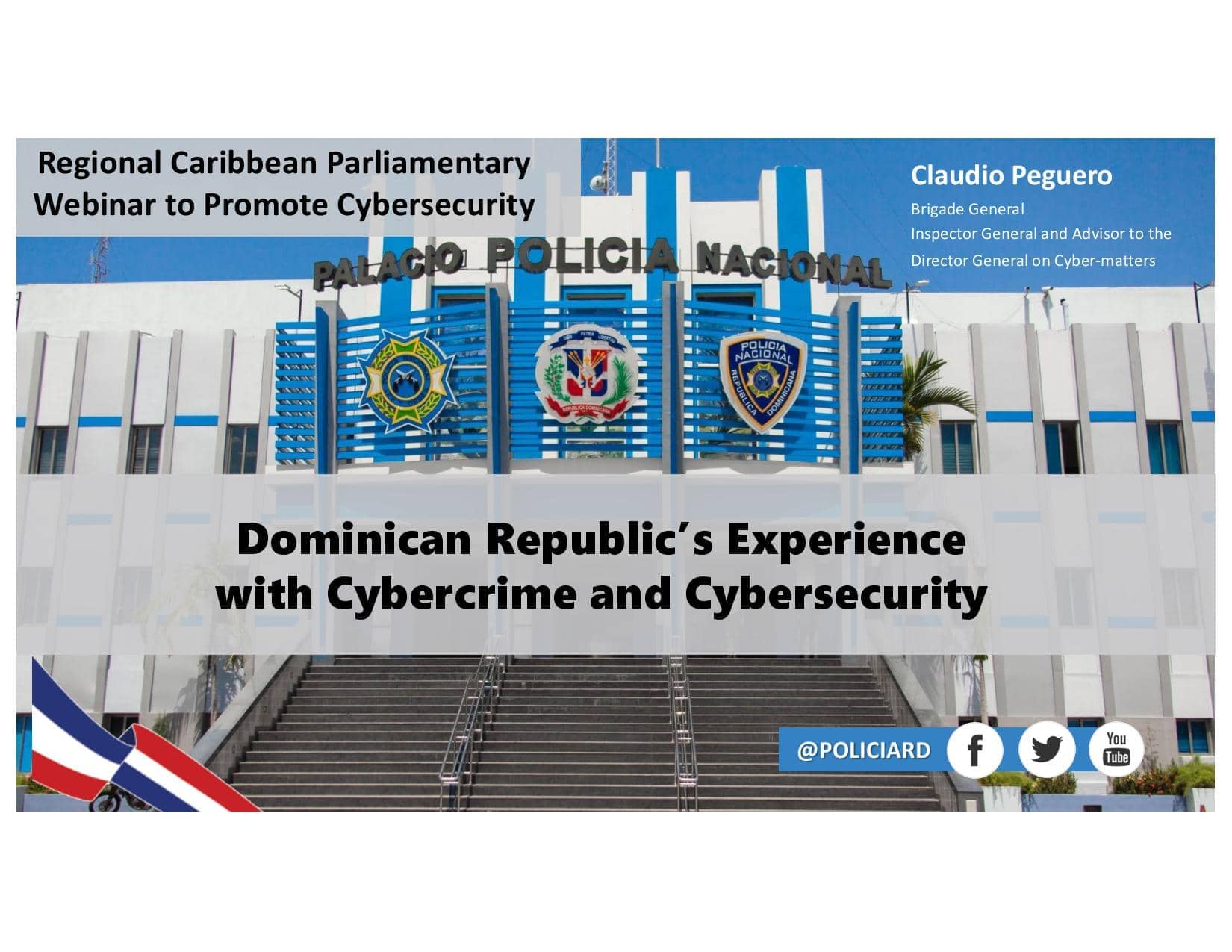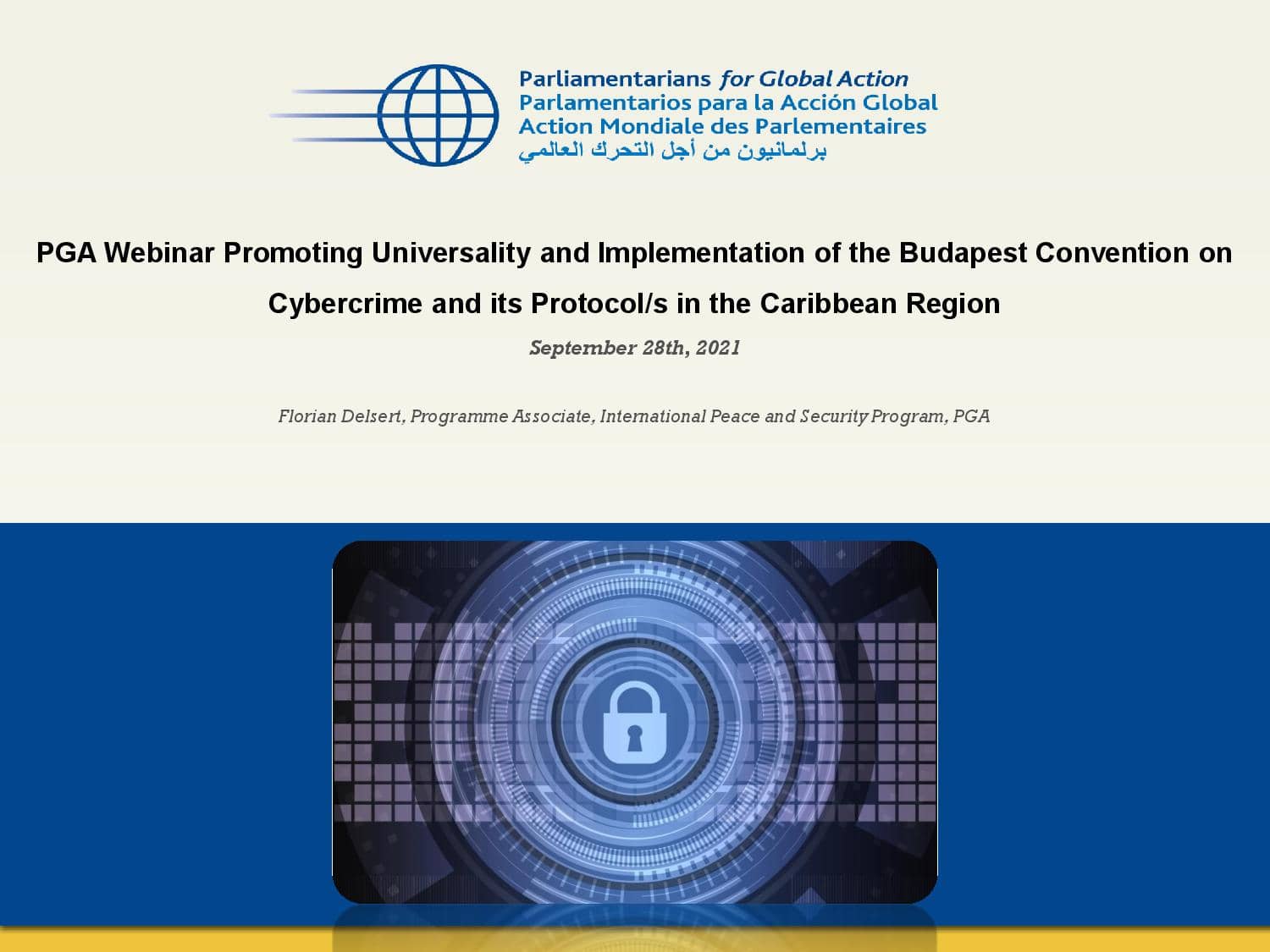
September 28th, 2021
In cooperation with the Council of Europe, PGA's International Peace and Security Program organized a Regional Caribbean Webinar on September 28th, 2021 - Promoting Universality and Implementation of the Budapest Convention on Cybercrime and its Additional Protocols in which participant MPs and Government officials from Barbados, Grenada, Saint Lucia, Suriname and Trinidad and Tobago, as well as representatives from the Council of Europe Cybercrime Program, experts nominated by the Council of Europe – Cybercrime Division, and Dominican Republic also participated together with a senior expert from the OAS.
This Webinar was the second of a series of 4 such activities in Africa, Latin America, Asia/Pacific and Caribbean/CARICOM, jointly implemented by PGA and the Council of Europe, to promote Universality and Implementation of The Budapest Convention on Cybercrime and its Additional Protocol/s.
The event was opened by Mr. Peter Barcroft, Senior Director of the International Peace and Security Program of PGA, providing an extensive overview of the importance of the subject matter of the Webinar.
Mr. Barcroft then introduced Mr. Anthony Teelucksingh, Chair of the OAS/REMJA Working Group on Cybercrime, who drew attention to the fact that the OAS has recommended that all OAS Member States proceed to ratification of/accession to the Budapest Convention on Cybercrime. Mr. Teelucksingh also set out the different ways in which the OAS/REMJA Working Group supports Member States in their accession efforts to the Budapest Convention.
Thereafter, Mr. Virgil Spiridon, Head of Operations, Cybercrime Program Office of the Council of Europe (C-PROC), outlined the role and functions of C-PROC as well as the main attributes of the Budapest Convention and its sphere of activities. The Program, to date, has assisted more than 150 countries in their capacity building and legislation pertaining to the Budapest Convention.
Senator Wade Mark, Chair of the PGA National Group of the Republic of Trinidad and Tobago stated that his country has been pursuing cybercrime legislation through the Cybercrime Bill of 2017 but also pointed out that some of the provisions in this Bill were intrusive with respect to personal privacy and human rights and freedom of the press. For this reason, Senator Mark and his colleagues had not been able to date to support the Bill, until such time as these more problematic provisions are removed.
Ms. Betty Shave, Council of Europe expert and former Assistant Deputy Chief for International Computer Crime, Computer Crime and Intellectual Property Section, US Department of Justice spoke at length on the importance of the Budapest Convention in the criminalization of particular conduct, the procedural tools and the international cooperation, concluding with a few points on the process to join the Budapest Convention. Ms. Shave also noted that the First Additional Protocol to the Convention, outlawing usage of computers/information systems to conduct xenophobic activities reflects a concern which is a particular priority also now. Ms. Shave also helpfully observed how Legislators themselves can be personally impacted by cybercrime, in their capacity as lawmakers and email communications they receive. Ms. Shave also pointed out that the significant assistance on offer from the Council of Europe was complimentary, open to be availed of by all interested States.
Mr. Florian Delsert, Program Associate - International Peace and Security Program of PGA, subsequently drew attention to the numerous, different pragmatic steps that Parliamentarians, both as advocates and lawmakers, can take to promote universality and implementation of the Budapest Convention and its Additional Protocols. Mr. Delsert also pointed out examples of cyberattacks that targeted national parliaments in Finland, Norway, Belgium, and Australia in the past few years, before making brief reference to relevant existing legislation in a number of countries in the wider Caribbean region.
Participants had the opportunity to make comments and ask questions of the panelists during several interactive dialogue sessions.
Sen. Wade Mark observed that lack of political will to ratify and implement the Convention and asked for suggestions on how new ways could be explored to generate this all important political will.
Ms. Shave, the Council of Europe expert, in response, shared her experience in stating that it often comes from the strong commitment of just one individual having a strong interest in the question of cybercrime and engaging in continuous outreach. Mr. Barcroft, echoing Ms. Shave's remarks, noted that often, one parliamentary champion is needed to move matters forward.
A subsequent presentation was also made by Claudio Peguero, Brigade General, Inspector General and Advisor to the Director General on Cyber-matters with the National Police of the Dominican Republic. Mr. Peguero shared with the participants the experience of Dominican Republic in prosecuting cybercrime in the early 2000s, before the country ratified the Budapest Convention. Senator Jose Del Castillo Saviñon from the Dominican Republic in his following remarks helpfully highlighted how the Senate of the Dominican Republic was now proceeding in seeking to implement fully the Convention.
In their concluding remarks, Mr. Spiridon and Ms. Catalina Stroe of the Council of Europe Cybercrime Program underlined a few key points. It is important to build capacities as cybercrime is a transversal and global phenomenon. Criminal justice needs to be equipped with appropriate tools to fight it and policymakers need to be made fully aware of these issues. The Council of Europe stands ready to support countries worldwide who are interested and that significant assistance can be provided.
Mr. Peter Barcroft, Senior Director of the International Peace and Security Program of PGA, concluded the webinar by thanking all the attendees for the level of interactive discussion, recalling that parliamentarians have a decisive and central role to play in promoting universality and implementation of the Budapest Convention and its Additional Protocols - and that these Webinars, for PGA, are very much a beginning - not an end - process.
List of Participants
| Name | Title | Organization | Country |
| Ms. Betty Shave | Council of Europe Expert, Former Assistant Deputy Chief for International Computer Crime, Computer Crime and Intellectual Property Section, US Department of Justice. | Council of Europe | United States |
| Mr. Daniel Ackerman | International Computer Hacking & Intellectual Property Advisor, Latin America & The Carribbean | U.S. Department of Justice | United States |
| Mr. Anthony V. Teelucksingh | Senior Counsel | U.S. Department of Justice | United States |
| Mr. Claudio Peguero | Brigade General, Inspector General and Advisor to the Director General on Cyber-matters | National Police | Dominican Republic |
| Senator Jose Del Castillo Saviñon | Senator | Senate of Dominican Republic | Dominican Republic |
| Sen. Wade Mark | Senator | Senate of Trinidad and Tobago | Trinidad and Tobago |
| Hon. Patrick Kensenhuis | MP | Parliament of Suriname | Suriname |
| Mr. Lawrence Samuel | Coordinator | National Telecommunications Regulatory Commission | Grenada |
| Mr. Andre Griffith | Cybersecurity Consultant | Ministry of Innovation, Science and Smart Technology | Barbados |
| Hon. Andy Daniel | MP | House of Assembly of Saint Lucia | Saint Lucia |
| Mr. Virgil Spiridon | Head of Operations, Cybercrime Program Office of the Council of Europe (C-PROC) - CoE | Council of Europe | Romania |
| Ms. Catalina Stroe | Program Manager - Cybercrime Program Office (C-PROC) - CoE | Council of Europe | Romania |
| Ms. Nina Lichtner | Program Officer - Cybercrime Division - CoE | Council of Europe | Romania |
| Ms. Sinziana Hanganu | Project Officer | Council of Europe | Romania |
| Ms. Andrada Antofie | Project Assistant | Council of Europe | Romania |
| Mr. Andrei-Stefan Candrea | Project Assistant | Council of Europe | Romania |
| Ms. Elena Floroiu | Project Assistant | Council of Europe | Romania |
| Ms. Gratiela Dumitrescu | Project Assistant | Council of Europe | Romania |
| Ms. Elena Duta | Project Assistant | Council of Europe | Romania |
| Ms. Floriane Spielmann | Project Assistant | Council of Europe | Romania |
| Mr. Peter Barcroft | Director of the International Peace and Security Program of PGA | PGA | United States |
| Mr. Florian Delsert | Program Associate - International Peace and Security Program of PGA | PGA | United States |







